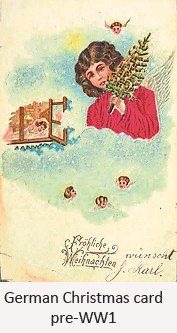Christmas Day 1914 marked one of history’s most famous football matches. A few months earlier, World War I had erupted and the fierce fighting had already claimed nearly a million lives. But around Christmas a series of unofficial ceasefires occurred along the Western Front.
Despite the cold, frosty conditions, German soldiers began singing, ‘Silent night, holy night’. Then soldiers from both German and British sides ventured into No Man’s Land, where they exchanged food and souvenirs, and eventually played football games together!
Hours later the killing continued. It was a moment of peace in a period of terrible hostility.
Promised peace
Nineteen centuries earlier, hardy shepherds living out in fields near to Bethlehem were keeping watch over their flocks at night. An angel of the Lord appeared to them and said, ‘Do not be afraid. I bring you good news of great joy which will be for all people. For there is born to you this day, in the city of David, a Saviour, who is Christ the Lord’.
Then ‘suddenly a great company of angels appeared, praising God and saying, “Glory to God in the highest, and on earth peace, goodwill toward men”.’
God always keeps his promises, so where is the peace that God had promised? How is it that 2000 years later war, terrorism, violence, aggression and hatred persist on a global and local scale?
And why do outbreaks of peace not last? Over 8,000 peace treaties have been made and broken in the last 3,100 years, in which only 286 years have been without war. Peace has to be more than just a brief moment when people are reloading their weapons.

God did not send a politician to earth to broker peace, nor a paid mediator to negotiate a compromise. And certainly God is not guilty of hatred and hostility. He remains holy, true and pure. We are the ones who have gone our own way and defied him by ignoring all that he has for us. The Bible says of God that ‘the Father sent the Son to be the Saviour of the world’ (1 John 4:14).
Asked on Desert Island Discs which book he would choose to take with him if marooned on an island, Field Marshal Lord Montgomery replied that he would take his own book, The history of warfare, and devote his time to pondering how he could stop people from fighting.
Prince of peace
Jesus came not to ponder peace, but to bring peace. He is called the ‘Prince of peace’.
The baby Jesus lying in a crib was destined to die on a cross. There he would carry on himself the sin of the world. All that is against God and his perfect standards Jesus took on himself.
He died paying the penalty for the wrong of which we are all guilty. He, the substitute, died so that we might be forgiven and brought into the family of God, enjoying peace with him. Now the living Jesus, who rose from the dead, offers his peace to us all.

When will ‘the war of the worlds’ end? Bible prophets, who foretold the coming of Jesus centuries before he was born, also speak of his coming back to earth to rule as the King of kings and Lord of lords.
His reign will be one of peace, justice and righteousness. Everyone who knows Jesus as their personal Lord and Saviour will be with him.
The Bible says that then, ‘God will judge between the nations and will settle disputes for many nations. They shall beat their swords into ploughs, and their spears into pruning hooks. Nation will not take up sword against nation, nor will they train for war any more’ (Isaiah 2:4).
Your most pressing need today is not for a temporary truce, but to be at peace with God, who gave you life, and who loves you and invites you to himself.
If you will turn from all that keeps you from God, and trust Jesus to make you his own, you will find the peace that God promised to the shepherds at that first Christmas time.
Roger Carswell
The picture of the Christmas Truce 1914 shows German soldiers of the 134th Saxon Regiment with men of the Royal Warwickshire Regiment, in No Man’s Land, on the Western Front.




